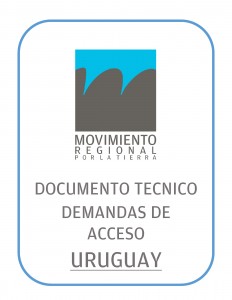Demanda de tierras en Uruguay - Alejandro Arbulo y Pablo Díaz. (agosto 2015)
Documento exploratorio que analiza las acciones y demandas de las principales organizaciones sociales que representan a asalariados rurales y productores familiares en los últimos 10 años, describe los principales conflictos locales suscitados en torno al acceso a la tierra y plantea estimaciones aproximativas sobre la cantidad de solicitantes de tierra, tanto a nivel nacional como regional.





